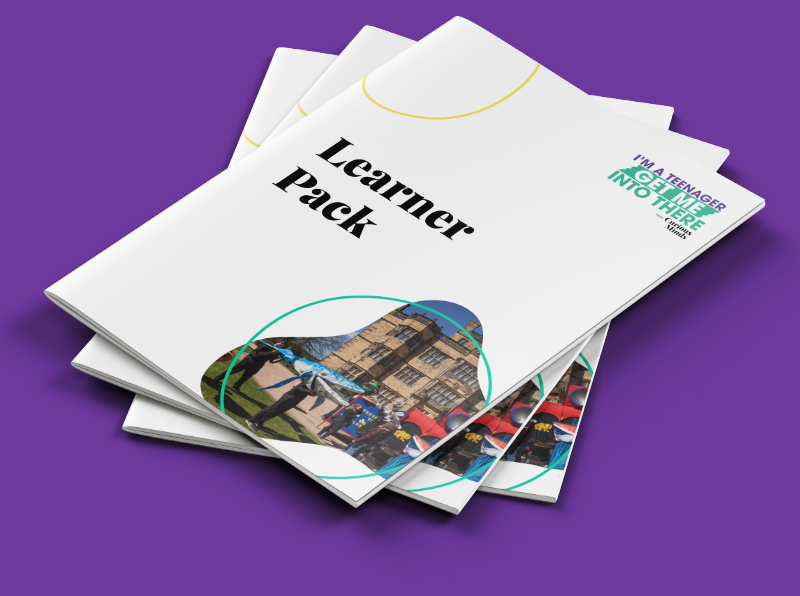
Unwritten Rules
Unwritten rules of your venue
This module is split into two: Written Rules and Unwritten Rules. Now you have completed the activities in the Written Rules module you are ready to examine the Unwritten Rules.
Just like the previous module, you will examine the visitor experience focusing on the way you communicate the rules of your venue with your audiences and how that might affect young people.
This time you will examine the unwritten rules that exist within your venue. These tend to be expectations or assumptions of behaviour and attitudes that we expect our visitors to adhere to, but are often not communicated clearly, if at all.
It is important to have expectations around behaviour within our venues to create a positive experience for everyone. However, first time visitors may have no prior experience of similar venues and little or no knowledge of these unwritten rules or codes of behaviour. Teenagers, in particular, are very self-conscious and do not like to be embarrassed, especially in front of their friends. They may be very anxious about being ‘told off’ and feel unsafe if they don’t know how they are expected to behave, making it more likely they will do something ‘wrong’.
This is particularly important for young people who are building up their cultural and social capital. We will look at this a little later.
Rules can also help young people feel safe, and you may find they are glad to know they are in place. For example, if they know it is not acceptable to shout in an exhibition as well as knowing how they are expected to behave, they know that nobody is likely to shout at them.
Their experience in your venue can be dictated by how easily they can understand your expectations of them, and what they can expect of other people. If your expectations of behaviour are not clear and they have no prior experience of a similar venue, how are they to learn and understand the expectations put upon them?
Although we are focusing on young people this will work for all visitors.
Aims

1.
The different ways in which you communicate the unwritten rules of your venue

2.
Why your venue has the unwritten rules that it has and why it is important to maintain them

3.
How the unwritten rules of your venue can be made clearer and what their impact is on young people
Intro
In everyday life we come across lots of rules telling us how we must behave in certain situations and venues. We can also encounter a lot of rules that are not written down but we are expected to know. Can you recall a situation where you found yourself breaking a rule you didn’t know existed, or not knowing how you were supposed to be behave? Even as adults this can be very uncomfortable.
For example, in some theatres there is an unwritten rule that audiences should be silent whilst a performance is taking place. There are good reasons for this as it makes sure others can hear and understand the performance. On the flip side of this some performances actively encourage noisy participation… “Oh no they don’t!”
No wonder it’s so confusing and sometimes people behave in a way that is not expected!
Unwritten rules can be extremely hard to learn. Most of us learn through direct experience, observing other people, or by being corrected by trusted people. If we’re lucky we get to learn without being embarrassed or told off, and we’re at the greatest risk of breaking these rules when we do something for the first time.
So what do we do to help people navigate our spaces safety and positively? The default might be to write more rules, but that isn’t the answer. Remember if we overwhelm our visitors they might feel an urge towards ‘fight or flight’.
What we hope to do is support young people to build up their life experiences and ‘social and cultural capital’. This will help them feel more comfortable in more situations, and able to ask questions about things they don’t understand.
In order to understand what is meant by Cultural and Social Capital more please read the following article:
The Benefits of Cultural Capital
In your learning journal please write down your key learning around these theories.

Get your Learners Pack here
Activity 1
New situations
Before we examine the unwritten rules of our venue let’s try and remember what it was like for us to be in a new social or cultural situation where we didn’t know the expectations of our behaviour. For example, the first day at school or a new job, visiting your very first museum, or being in a country where you didn’t understand the language. Basically, somewhere where you were unfamiliar with expectations of behaviour and there was no easy way to find out.
In your learning journal write down:
- How you felt walking into that space?
- Was there anything or anyone that made you feel at ease?
- Was there anything or anyone that made you feel anxious?
- What would have helped you prepare for this experience?


Get your Learners Pack here
Activity 2
Advice from young people
Over time, through repetition we start to understand the expectations placed upon us in venues and we can easily forget what it is like to experience a particular venue for the first time.
Young people from Oldham Theatre Workshop would like to share with you what they would have liked to know before visiting a cultural venue. Hear their stories below.
In your learning journal please answer the following questions:
Did you hear anything that surprised you?
Are there any suggestions from the young people that you can implement now or in the future?

Get your Learners Pack here
Activity 3
Interrogating your unwritten rules and their meaning
Reflecting on what you have learnt and heard so far please complete the table in your learning journal. You will need to:
- List all the unwritten rules of your venue. Please include subtle rules and the bigger rules too
- Explain why the rule is in place
- Highlight how the visitor is expected to know this rule
Look at all the unwritten rules you have listed, are there any that:
- Presume the visitor has been to a venue like this before?
- Could create a negative visitor experience?
- Aren’t consistent across the staff team or organisation?
Now imagine a young person visiting you for the very first time, with no knowledge or experience of your venue, or a similar venue.
- How might you help them navigate the unwritten rules?
- Think about the language you and your colleagues use, whose responsibility it is to communicate these rules
- How you could do this in a way that reassures and welcomes this new young visitor?
Please write your ideas down in your learning journal and share them with your colleagues.
Consolidating your learning
Here are some things to think about when auditing the unwritten rules in your venue…
Be aware visitors come with different levels of social and cultural capital
Be aware that other staff members and volunteers might have different unwritten rules to yourself
Always have in mind the visitor's journey from the moment they approach your building for the very first time to the end of their visit
Think about how you can support visitors to navigate the unwritten rules of your venue
In your learning journal please reflect on what you have learnt today and how you could put this into action in your venue.

Get your Learners Pack here
And Finally
How are you going to share your learning with your colleagues? Your visitors?
Did you have any lightbulb moments?
Write down one small thing you are going to do as a result of this module.
Write one bigger thing you are going to do as a result of this module.